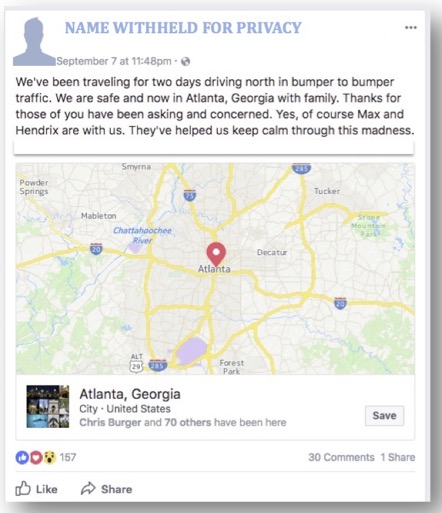As Hurricane Irma came and went, I wondered about people doing the wrong things for the right reasons. By that, I mean that they tried to do the right thing, but they still ended up with poor results. For example, during the hurricane, we initially expected a large hit in South Carolina. So the prudent made plans, and got out of town.

After all, the National Weather Service projected a hit. On Thursday, President Trump was briefed on the same storm-path projection. At that point, it only seemed prudent to get out of town. But that was cold comfort to those who left for Georgia or Tennessee only to place themselves directly in the path of the shifting storm.[i]
Storms are unpredictable so it is hard to blame these folks for their results. It is understandable to make this kind of error in light of the information that we had at the time. Others, however, made different errors. They posted about their time away from their homes on Facebook. In doing so, they created potentially dangerous situations.
These people wanted their friends and loved ones to know that they were safe where they landed, and Facebook was a convenient way to get that message across. It was doing the wrong thing for the right reasons. At a time where 6.5 million people were ordered to evacuate Florida,[ii] such posts are a burglar’s dream come true. In this case, prudence required a different response.

In business, we make mistakes too as when we misread the market. The market is complex and difficult to understand. Not everyone gets it right.
However, many mistakes can be avoided. In such cases, we know what to do, but we do something else. Maybe we do this because it is easier; maybe because of ignorance. In either event, it is like an error in baseball—sometimes called and unforced error. No one faults an outfielder who fails to catch a ball that was hit out of the park, but when he bobbles a ball that he should have caught, he is charged with an error.
The same thinking should apply in business. We can’t control everything, but we should be careful to limit the number of errors that are within our control.
Common Errors in Business
- Entrepreneurs often fail because they do not know what they do not know. That is not the problem. The error comes when they do not take the time to learn how to run the business.[i]
- Managers tend to focus on extrinsic rewards (e.g., bonuses, perks, etc.) when the preponderance of evidence shows that intrinsic rewards (e.g., creativity and autonomy) drive motivation.[ii]
- Salesmen tend to talk more than they should even though they know that customers want them to listen.[iii]
- Networkers fail to focus on the person in front of them because they are overly concerned with other people with whom they wish to connect.
In each of these cases, they do the wrong things for the right reasons. Entrepreneurs want to succeed. Managers want employees to be motivated. Salesmen want to complete the sale. Networkers want to make more connections. Their intentions are good, but good intentions do not blunt the consequences of incorrect actions.
What About You?
What actions are you taking that are standing in the way of your success? Are you doing the wrong things for the right reasons?
-Darin Gerdes
References
[i] Gerber, M. E. (1995). The E-myth revisited. New York, NY: HarperBusiness
[ii] Kohn, A. (1993, September-October). Why incentive plans cannot work. Harvard Business Review. Retrieved from https://hbr.org/1993/09/why-incentive-plans-cannot-work
[iii] Martin, S.W. (2017). 6 reasons salespeople win or lose a sale. Harvard business review. Retrieved from https://hbr.org/2017/06/6-reasons-salespeople-win-or-lose-a-sale
[i] Photos from President Donald J. Trump’s briefing on Hurricane Irma. The White House. Retrieved from https://www.whitehouse.gov/the-press-office/2017/09/07/photos-president-donald-j-trumps-briefing-hurricane-irma
[ii] Nehamas, N. (2017, September 15). Built for bottleneck: Is Florida growing too fast to evacuate before monster storms. Miami Herald. Retrieved from http://www.miamiherald.com/news/weather/hurricane/article173494726.html
______________

Dr. Darin Gerdes is an Associate Professor of management in the School of Business at Charleston Southern University. All ideas expressed on www.daringerdes.com are his own.
This post was originally created for Great Business Networking (GBN), a networking organization for business professionals where Dr. Gerdes is the Director of Education.
______________
